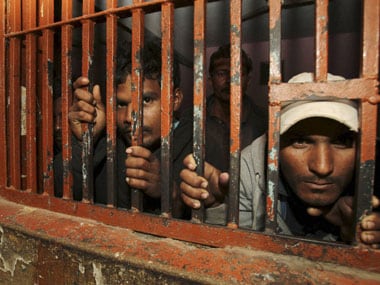As many as 1,702 prisoners died in jails nationwide in 2014, according to this
reply by the ministry of home affairs to the Lok Sabha (Parliament’s lower house) in August 2016. While 1,507 (89 percent) died of natural causes, 195 (11 percent) died of unnatural causes, such as “suicide, execution, murder by inmates, deaths due to assault by outside elements, death due to firing, deaths due to negligence/excess by jail personnel and others”, said another home ministry’s
statement released to the Lok Sabha in March 2016. Deaths in prisons increased 28 percent between 2011 and 2014, up from 1,332 to 1,702. While 21 percent more prisoners died of natural causes over four years to 2014, deaths from unnatural causes more than doubled from 88 cases in 2011 to 195 in 2014. The administration and management of prisons is primarily the responsibility of the state governments. Prisons in Uttar Pradesh reported more natural deaths (300) than any other state, followed by Punjab (218) and Madhya Pradesh (122). Over four years to 2014, Uttar Pradesh reported a 6 percent increase, Punjab a 114 percent increase and Madhya Pradesh a 47 percent increase in natural deaths. Odisha prisons reported a 1,367 percent increase in unnatural deaths over four years, rising from three in 2011 to 44 in 2014. After Odisha, the largest number of unnatural prison deaths were reported from Uttar Pradesh (23), West Bengal (21) and Karnataka (15) that year. Tamil Nadu, which lead the unnatural-death ranking in 2011, saw a 67 percent decline in 2014, from 15 to five. [caption id=“attachment_2985276” align=“alignleft” width=“380”]
 Representational image. PTI[/caption] Indian prisons at 117 percent of capacity India’s jails held 418,536 prisoners at the end of 2014. Uttar Pradesh (88,221), Madhya Pradesh (36,433) and Bihar (31,295) had the highest number of prisoners, according to this March 2015 home ministry
reply to the Lok Sabha. India’s prisons are 117 percent over capacity, or almost 62,000 inmates more than they have space for. Dadra and Nagar Haveli prisons are the most overcrowded, at 231 percent of capacity, followed by Chhattisgarh (159 percent), Arunachal Pradesh (127 percent) and Delhi (122 percent). Nagaland’s prisons are filled to 69 percent of capacity, followed by Tripura (58 percent), Lakshadweep (56 percent) and Daman and Diu (44 percent). Most Indians in prisons abroad in Saudi Arabia There are 6,804 Indian nationals in foreign prisons, according to this May 2016
answer in the Rajya Sabha, the largest number in Saudi Arabia (1,696), followed by United Arab Emirates (1,143), Nepal (859) and Kuwait (434). As many as 49 Indian nationals have died in foreign jails since 2013, according to this May 2016 external affairs ministry
statement to the Lok Sabha. More Indians (13) died in Pakistani prisons than any other country; 11 died in Saudi Arabia and six in Bangladesh. (Grocchetti is a multimedia journalist and has a BA degree from Napier University, Edinburgh.)
As many as 1,702 prisoners died in jails nationwide in 2014, according to this reply by the ministry of home affairs to the Lok Sabha (Parliament’s lower house) in August 2016.
Advertisement
End of Article


)

)
)
)
)
)
)
)
)



